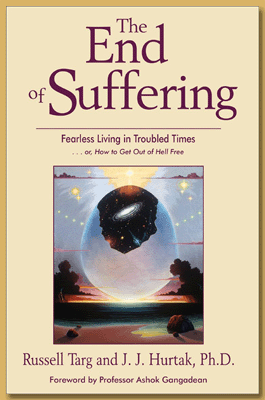|
This inspiring book shows step-by-step, how we can learn to surrender the story of who we think we are, and experience the end of our suffering. The authors' goal is to provide direct experience of the fact that the peace, love, and spaciousness we are all looking for is already within us--it is who we are!
 This book is a collaboration between Russell Targ, a laser physicist, pioneering psychical researcher, and writer, and J. J. Hurtak, a social scientist and spiritual teacher in both Judeo-Christian and Buddhist traditions. This practical guide brings together the enduring teachings of the East on peacefulness and self-realization, and puts them into a modern framework emphasizing experience over belief.
This book is a collaboration between Russell Targ, a laser physicist, pioneering psychical researcher, and writer, and J. J. Hurtak, a social scientist and spiritual teacher in both Judeo-Christian and Buddhist traditions. This practical guide brings together the enduring teachings of the East on peacefulness and self-realization, and puts them into a modern framework emphasizing experience over belief.
This book demonstrates that the dualistic logic of Aristotle is a significant source of suffering today. It is through his writings on non-contradiction that we are falsely taught that we and the Divine are separate--rather than one. It leads people to say absurd dualistic things like, "Those who are not with us are with the terrorists."
Buddha taught us to live a helpful and compassionate life, and to surrender our ego to the peace of spaciousness. This Mahayana middle path was greatly expanded by the Second Century genius Nagarjuna. Whereas Aristotle taught that an idea is either true of false, Nagarjuna demonstrated that most things are neither true, nor not true. The so-called complementarity of waves and particles in modern physics support this view, along with the famous indeterminacy theorem of Kurt Gödel. The modern physics of nonlocality and our own laboratory experience with remote viewing (psychical) research all show our potential for experiencing expanded awareness.
This book is a uniquely understandable treatment of Nagarjuna's peerless teachings on logical thought and emptiness. The Dalai Lama described Nagarjuna as one of the truly enlightened people of all time. Targ and Hurtak describe a peaceful and joyful path based on these teachings.
It is inspiring to find these two pioneering souls come together to to offer humanity a way through the suffering; a way that is gentle, loving, and tried and true, and explained with superb clarity and compassion. The combined genius of the two authors gives a most valuable guide through the dark night into the the light that is our true birthright."
Barbara Marx Hubbard
President Foundation for Conscious Evolution
I have admired Russell Targ's insights into consciousness and non locality for many years. He has a scientific mind, but also a great experiential understanding of spirituality. The End of Suffering is an important contribution to consciousness evolution in our troubled times.
Deepak Chopra MD
Author, Peace is the Way and How to Know God
Bravo to Russell Targ and Jim Hurtak for gifting us with a practical book for a troubled time.
Drawing upon the perennial wisdom, they point to judgment and attachment as the magnets to suffering and the barriers to love. This is truly philosophical dynamite.
Gerald G. Jampolsky, MD
(Best selling author of titles such as "Love is Letting Go of Fear")
A brilliant, heart-filled book by a legendary consciousness researcher. It teachers us something precious: how to lead compassionate, aware lives and overcome suffering. A must-read book for everyone!
Judith Orloff MD
Author, Positive Energy and Second Sight
The End of Suffering by Russell Targ and J.J. Hurtak is so vital for all readers at this time. The authors perform here a great service to humanity by making Nagarjuna's teaching on the end of suffering transparent and accessible to the general reader. They make his profound innovations available and relevant to our lives in today's world. And readers who enter this work will find powerful tools and insights to bring to life, which will empower them to get right to the source and roots of their existential suffering. This important book fills a void and builds a bridge that helps make Buddha's global teachings and Nagarjuna's spiritual technology on the end of suffering a living reality for all who are now suffering in the human condition.
Prof. Ashok Gangadean
Philosophy Department, Haverford College
|
